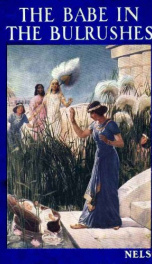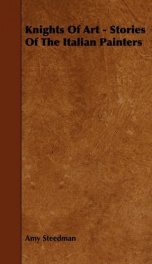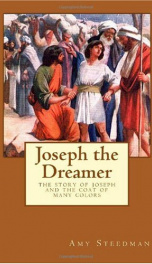The Babe in the Bulrushes

an excerpt from the first chapter:- THE FINDING OF MOSES Many long years had passed since the days when Joseph's brothers and their families had settled in the land of Egypt. They were a great nation in numbers now, but the Egyptians still ruled over them, and used them as servants. The Pharaoh who had been so kind to the shepherds from Canaan was dead long ago, and the new kings, or Pharaohs as they were called, hated foreigners, and began to treat the Israelites very harshly. There were too many of them, they said; it was dangerous to have so many strong, powerful slaves. They must be kept down, and made to work from morning till night, and be beaten if they did not work fast enough. That was very hard for the poor people; but worse was to come. An order was issued one day which spread sorrow through all the land of Goshen, where the Israelites lived. Every baby boy that was born was to be thrown into the river. Girl babies might be allowed to live, for they would be useful as slaves, but boys might grow up to fight for their country, and so they must be destroyed. In one little house, not far from the great river Nile, a woman sat holding her tiny baby in her arms, while the tears ran down her cheeks. He was such a beautiful baby, so strong and fair and healthy; but the king's order was that he was to be thrown into the river, where the cruel, hungry crocodiles were waiting to snap up everything they could find for a meal. Jochebed, the poor mother, held her baby closer in her arms. No, she could not obey the king's order. She would try and hide the baby for a little while, at any rate. It was easy to hide a baby while he was still tiny and slept most of the day; but when he grew bigger it was much more difficult. His sister Miriam did her best to help her mother; but any day, now that the baby was three months old, he might be discovered, and something must be done at once. So Jochebed thought of a plan, and prayed to God that He would help her to carry it out. At the edge of the river there grew tall bulrushes, which, when cut down and dried, could be made into many useful things. Taking some of these bulrushes, she wove them into a little cradle with a cover to it, just like a little ark, and this she covered with a kind of pitch, so that not a drop of water could come through. Inside the cradle she made a soft bed, and laid the baby there while he was fast asleep, and set the ark afloat in the water where the bulrushes were growing. She knew that presently the great princess, Pharaoh's daughter, would come down to bathe in the river, and would notice the queer little ark floating there.
Info about the book
Author:
Series:
Unknown
ASIN:
B003YOSAZQ
Rating:
3.5/5 (3)Your rating:
0/5
Languge:
English
Users who have this book
Users who want this book
What readers are saying
What do you think? Write your own comment on this book!
write a commentif you like The Babe in the Bulrushes try:
Other books by this author
Do you want to read a book that interests you? It’s EASY!
Create an account and send a request for reading to other users on the Webpage of the book!




